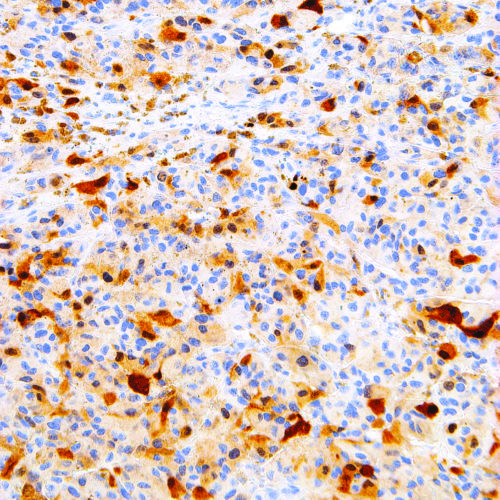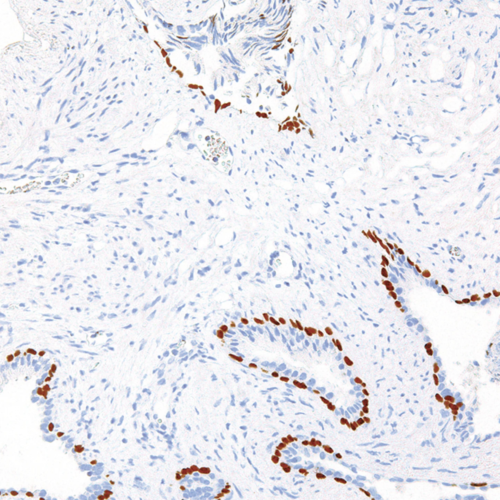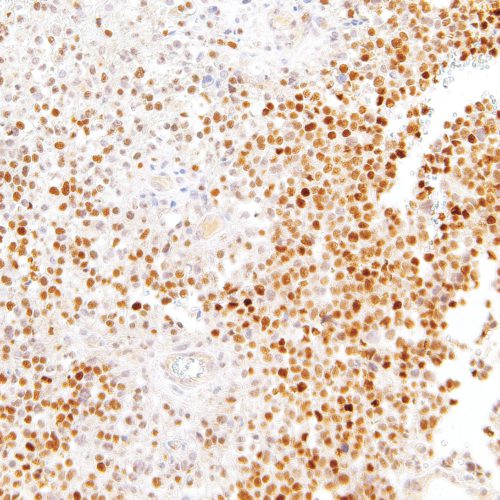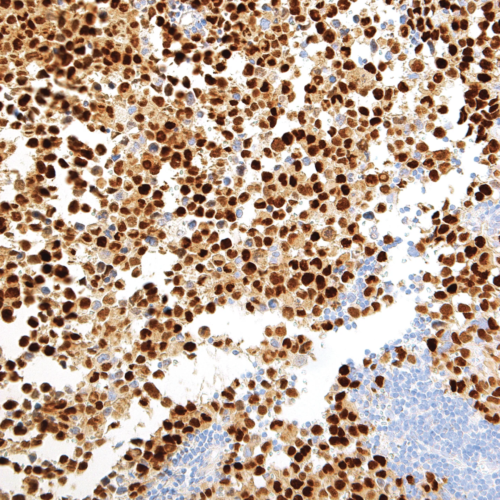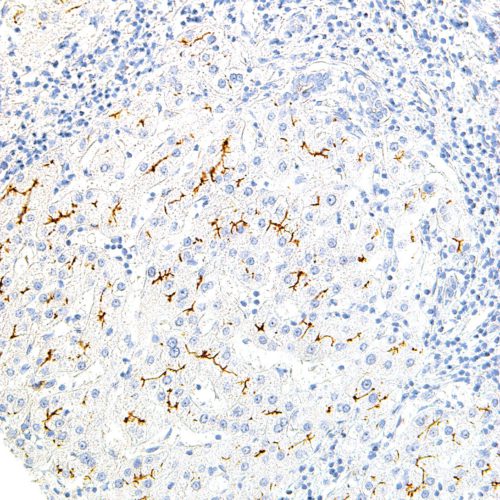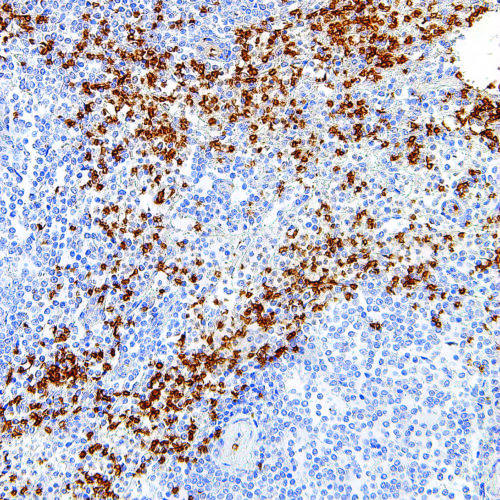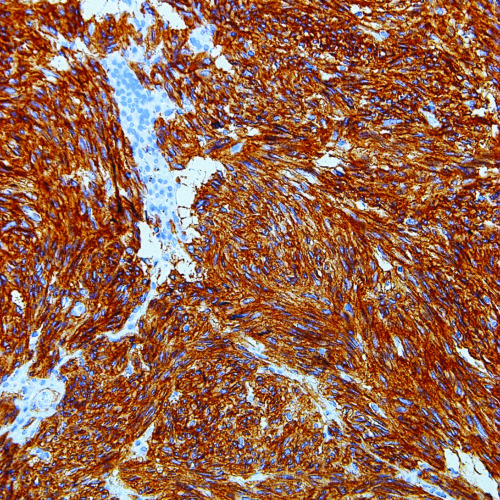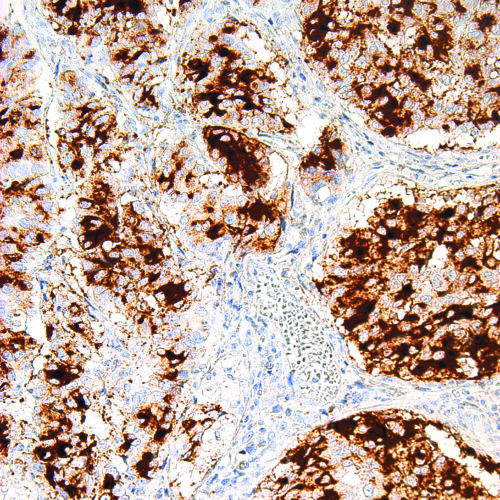High quality products to support Pathologists and Biological and Environmental Scientists
GeneAb™ S-100
$70.00 – $270.00S-100 is a low-molecular weight protein that is found in Schwann cells, melanocytes, glial cells, histiocytes, lipocytes, skeletal and cardiac muscle, chondrocytes, adipocytes, myoepithelial cells, macrophages, Langerhans cells, dendritic cells, and keratinocytes. S-100 is a useful marker for Schwann cell-derived tumors, as well as a number of well-differentiated tumors of the salivary gland, adipose and cartilaginous tissue. Anti-S-100 is used to detect melanomas, histiocytosis X, malignant peripheral nerve sheath tumors, and clear cell sarcomas.
GeneAb™ p63
$170.00 – $850.00p63 is a tumor suppressor protein that is very similar to p53 in structure and function, while being homologous to p73. p63 is important in development and differentiation, and has been identified as a useful marker for distinguishing between lung squamous cell carcinomas and adenocarcinomas. Anti-p63 is also used to differentiate between benign and malignant prostate and breast lesions, due to its labeling of the nuclei of myoepithelial cells in both tissue types.
GeneAb™ SOX-11
$125.00 – $510.00SRY (Sex Determining Region Y)-Box 11 (SOX-11), also known as transcription factor SOX-11, is a nuclear transcription factor that acts in regulation of embryonic development and in cell differentiation. SOX-11 is expressed in the development of the human central nervous system, medulloblastoma, and glioma, and has been indicated as a marker for both Cyclin D1-positive and negative mantle cell lymphomas, Burkitt lymphoma, and lymphoblastic lymphoma.
GeneAb™ Myogenin
$95.00 – $380.00Myogenin belongs to a family of myogenic transcription factors, including MyoD, myf5, and MRF4, which are critical in muscle development. Myogenin is found strictly in cells of skeletal muscle origin, and is therefore used as a biomarker for tumors of the muscle lineage, including alveolar rhabdomyosarcomas. Anti-Myogenin staining may occur in Wilms’ tumor, and labels the nuclei of myoblasts in developing muscle tissue. It is also expressed in some leiomyosarcomas.
GeneAb™ MDR3
$210.00 – $980.00Multidrug Resistance 3 (MDR3), also known as ATP Binding Cassette Subfamily B Member 4 (ABCB4), is a membrane-associated protein belonging to the superfamily of ATP-binding cassette transporters. MDR3 is an energy-dependent phospholipid efflux translocator that mediates the translocation of phosphatidylcholine across the canalicular membrane of the hepatocyte, and also acts as a positive regulator of biliary lipid secretion. Defects in MDR3 are associated with progressive familial intrahepatic cholestasis type 3 and gallbladder disease type 1. Co-overexpression of MDR3 and MRP1 has been documented as correlating with blastemal subtype and high-risk prognosis of Wilms’ tumor patients.
GeneAb™ Glycophorin A
$80.00 – $215.00Glycophorin A (GPA) and Glycophorin B (GPB) are erythrocyte blood group determinants that minimize erythrocyte aggregation during the circulation of blood. Anti-Glycophorin A is useful for understanding erythroid cell development and identifying erythroid leukemias.
GeneAb™ DOG1
$50.00 – $195.00DOG1, also known as Discovered on GIST-1, is a marker that highly specific for gastrointestinal stromal tumor (GIST). Anti-DOG1 is extremely sensitive for the detection of GIST and its diagnosis. Although some GIST stain weakly for c-kit, DOG1 is expressed in the vast majority of GIST cases. Reports have also indicated DOG1 as a marker for salivary acinar and intercalated duct differentiation.
GeneAb™ BG8, LewisY
$115.00 – $390.00BG8 LewisY, also known as LewisY blood antigen or simply BG8, is a blood group antigen that has been identified in many studies as a potential marker for differentiation between pulmonary adenocarcinoma (PACA) and epithelioid mesothelioma (EM). It has been reported that sensitivity of non-mesothelial antigens for adenocarcinoma is organ-dependent. When attempting to differentiate epithelioid mesothelioma from adenocarcinoma, BG8 LewisY performed at a sensitivity of 98% in the breast cancer group, and 100% in the lung cancer group.
